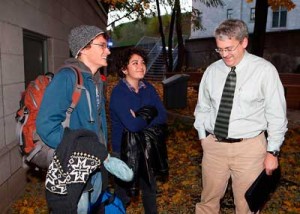
Fate of proposed Sustainable Projects Fund hinges on student referendum
By Neale McDevitt
You’ll have to excuse Jonathan Glencross if he feels like the soundtrack to his life these days sounds a lot like the Mission Impossible theme song – complete with the ominous burning fuse urging him to action before time runs and something goes boom.
Glencross, a U3 student at the McGill School of the Environment student, is one of the architects of the Sustainable Projects Fund (SPF) proposal that would see the administration and the student body team up to create a fund that would finance sustainability projects across both University campuses. The SPF would be worth approximately $840,000 per year over the three-year trial period from the winter semester of 2010 until the winter semester of 2013. The student contribution would consist of a $0.50 per credit “non-opt-outable” fee for the duration of the trial that would be matched dollar-for-dollar by the administration.
So why the burning fuse? To go ahead, 15 per cent of the student population must vote to accept the extra fee in a referendum that will run from Nov. 6-12. Bylaws dictate that the Yes Committee (to be spearheaded by Glencross and Rebecca Dooley, VP University Affairs, Students Society of McGill) can only begin campaigning on Nov. 3; can’t spend more than $200; and can’t use the University ListServ to help spread the word on an issue that most know absolutely nothing about. Tick, tick, tick…
While he admits that these restrictions present a “huge challenge,” Glencross says it isn’t mission impossible after all. What it will require is legwork, lots of legwork. “Basically, it means going to Council, speaking at every student association – getting the word out to as many people as possible,” he said. “We have no choice – we have six days to convince 3,000 students to vote and of those the majority must vote Yes.”
Despite the truncated time frame, a number of elements could work in favour of the Yes side. For starters, the right to pose the referendum question was passed unanimously by the SSMU Legislative Council. As well, the existing McGill Green Fee – in which students can volunteer to pay $1.25 per semester – has the highest opt-in rate of any other such student fee – “in the high 90s” said Glencross.
But what may ultimately win the students over is the unique structure of the SPF in which the administration has committed the approximate $1.25 million over three years up front on the condition that the amount is matched by students. “No other University has that incentive,” said Glencross.” The university will match student funding through fund raising efforts, use of capital funding sources where appropriate, and the allocation of resources from the existing sustainability fund.
The unique structure of the fund extends beyond mere financing. The SPF will be governed by a consensus-based parity committee with equal representation from students and administration.
“Consensus is a very powerful word to students,” said Glencross. “The fact that we’re transferring a lot of responsibility to a multi-stakeholder group – but not in a token way – is very important.”
A risk worth taking
On the administration side, Jim Nicell, Associate VP, University Services, had been pushing the SSMU to adopt a new fee for several years – although not without some trepidation. “This is a risky model for us because we’ve never [collaborated to this extent with students on issues of sustainability],” he said. “But if we want to create anything sustainable – a real culture of sustainability – we have to do so in a collaborative manner in which there is full engagement and support from both sides.”
Once in operation, the SPF will support any number of sustainability projects at McGill – be they proposed by students, staff, faculty or any combination of the three. Proposals would be reviewed by a committee of four members of the administration and four students representatives (two undergraduate students, nominated by the SSMU, one undergraduate student from Macdonald Campus, and one Post Graduate Student Society representative).
A portion of the SPF monies will be reserved to hire a Sustainability Coordinator for the three-year trial period, as well as 2-3 student work-study positions in tandem with this position. As the go-to person, the Sustainability Coordinator will coordinate applied student research, facilitate the application process, and ensure that approved projects are executed as planned.
Composting, retrofitting existing lighting, even the purchasing of electric vehicles – all are the types of initiatives that could benefit from the new fund. “The idea is to get everybody involved,” said Nicell. “We want projects that serve the larger interest of McGill, ones that explore new ideas that could eventually become the normal way we do business.”
When asked if he is worried about the referendum, Nicell is frank. “Yes, I am. While we have a strong green culture at McGill, it is a minority culture – it is peripheral. By far, the majority of people aren’t really engaged in this.
“Not to mention the phenomenally compressed timeline for the referendum. This is going to be tight,” said Nicell.
For his part, Glencross is asking that every McGillian get involved with the referendum, be they students casting their vote or staff and faculty encouraging students to participate. Should the Yes side carry the day, the door will open to a world of possibilities. “I challenge everyone – staff, students and faculty – to come up with ideas,” said Glencross. “It will be a couple of months before this is instituted, but people have to start thinking about the kind of role they want to play in what will be a huge culture shift.”
Online voting will take place from Nov. 6-12 at www.vote.electionsmcgill.ca. Regular voting will take place from Nov. 10-12 at Leacock, Bronfman and Shatner (during the day) and at New Rez and Bishop Mountain Hall during the evenings of Nov. 10-11.
